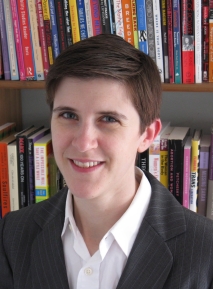Focus on: Devon Greyson
January 6, 2014
Highlighting research by members of the Canadian library and information management community.
PhD Candidate, University of British Columbia

What is your research topic?
My doctoral thesis research looks at the impact of health-related information practices on the lives of early-age parents (ages 15-24).
Many people who have been pregnant or parented a small child will be familiar with the experiences of needing health information, receiving health and parenting advice, and being asked a lot of health-related questions. These experiences can be even more intense with “high risk” populations such as teenage and low-income parents.
I am interested in how all these “information interventions” act in the context of people’s real lives. When do they complement people’s own health information needs, seeking, and use, and when is there a mismatch? What information really matters when people are making health decisions?
What interested you in that topic?
My general areas of research interest are: a) how people use health information, and b) how our health information practices and systems can make health and social inequities better or worse. Within these big research questions related to information practices and health behaviour, my doctoral project unites several of my major topics of interest: adolescents, pregnancy and parenting, gender and culture, public policy and addressing social inequities.
I especially like to work with youth and families, and am invested in helping give young people and other marginalized populations a voice in the policies and programs that impact their lives. I love that my fieldwork involves holding babies, and that my research will actually influence policies and programs aimed at supporting young parents and families in the future.
Something unusual about my work is that I’m conducting information practices research from within a research group that is based in public health, not LIS. I feel strongly about the importance of reaching out beyond our discipline, in order to learn from and contribute to fields such as public health and education. Public health, for example, frequently uses information to intervene in an attempt to change or monitor people’s health behaviour, and stands to benefit from information behaviour theory and knowledge.
What impact would you like to see your research have on LIS practitioners?
I think there are different take-home messages for different types of LIS practitioners, because it’s such an interdisciplinary project.
For example, for public and school librarians, there are some practical ideas for engaging “at risk” youth and young families, and for increasing the usefulness of technology in formal learning spaces. For medical librarians, on the other hand, this research begins to unpack the role of information within health behaviour and decision-making, an area where LIS professionals, with our understanding of human information behaviour, have a lot to offer health disciplines.
What emerging topics do you foresee in the future of LIS research?
I see an explosion of health information research right now, as we societally grapple with increasing health needs, health policy and system questions, and the shift to a digital era, complete with related access and privacy issues.
As we become increasingly comfortable with electronic information sources and practices, I expect our lines between online and offline life to become more blurred, which will influence the research questions we ask, as well as our methods for finding answers.
LIS has always been an interdisciplinary field, but I anticipate an increase in collaborative research across disciplinary boundaries, driven in part by scarce research funding resources and the increasing emphasis on sound bite-friendly research that addresses universal questions.
What advice would you give to LIS students or practitioners hoping to engage in research?
I initially became involved with research as a practitioner, and I would encourage other LIS practitioners to do the same.
Practitioner involvement in research is very important in order to make sure research is addressing issues of importance to working librarians. Involvement in research benefits practitioners by helping them develop and maintain research skills—something that is increasingly important in this era of evidence-informed practice and the need to justify the funding for information personnel, infrastructure and services.
As a working librarian, I found it extremely helpful to partner with and learn from experienced researchers. Some of these were other information professionals with more research experience, but most were academics in other disciplines. By working with and for scholars with strong research skills, I was able to improve my own abilities, build my publication record, and learn about various disciplinary research cultures.
Many medical disciplines have “clinician-researcher” roles and training opportunities that facilitate the spanning of the research/practice divide. I would love to see us develop something similar for LIS professionals, in order to lower the barriers to building a cadre of information practitioner-researchers across LIS specialities.
Select Bibliography
Greyson, D., Surette, S., Dennett, L., & Chatterley, T. (2013). “You’re Just One of the Group When You’re Embedded”: Report from a Mixed-Method Investigation of the Research-Embedded Health Librarian Experience. Journal of the Medical Library Association, 101(4): 287–297. doi: 10.3163/1536-5050.101.4.010
Dennett, L., Chatterley, T., Greyson, D., & Surette, S. (2013). Research – Embedded Health Librarianship: The Canadian Landscape. Journal of the Canadian Health Libraries Association, 34(2), 61-68. doi: 10.5596/c13-024
Greyson, D., Cunningham, C., & Morgan, S. (2011). Information behaviour of Canadian pharmaceutical policy makers. Health Information and Libraries Journal, 29(1), 16-27. doi: 10.1111/j.1471-1842.2011.00969.x
Greyson, D. (2010). Non-biomedical sources for systematic reviews of pharmaceutical policy. Journal of the Medical Library Association, 98(1), 85-87. doi: 10.3163/1536-5050.98.1.021
Greyson, D., Vézina, K., Taylor, D., Morrison, H., & Black, C. (2009). University supports for open access: A Canadian national survey. Canadian Journal of Higher Education, 39(3), 1-32.
Add a new comment